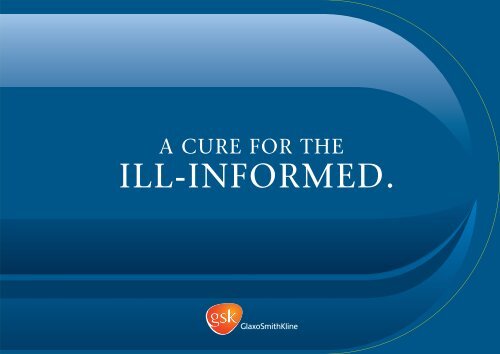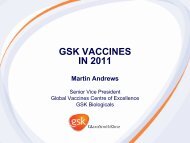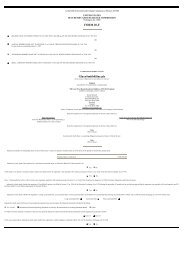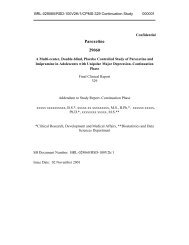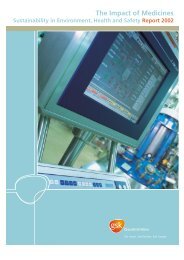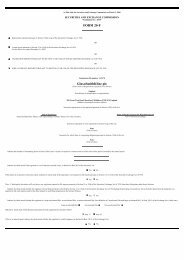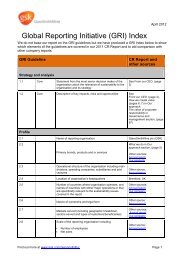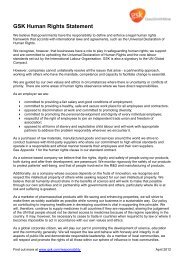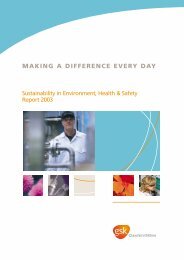GSK - Global Manufacturing Services - Brochure
GSK - Global Manufacturing Services - Brochure
GSK - Global Manufacturing Services - Brochure
Create successful ePaper yourself
Turn your PDF publications into a flip-book with our unique Google optimized e-Paper software.
A CURE FOR THE<br />
ILL-INFORMED.
CONTENTS<br />
A warm welcome 1<br />
An overview of GMS 2<br />
An expanse of opportunity 3<br />
Working together 4-6<br />
A product in profile 7<br />
Acting responsibly 8<br />
The people behind the place 9-10<br />
Training & development and accreditation 11<br />
Rewards and recognition 12<br />
The details of the programme 13<br />
Next steps 14<br />
Dear Graduate<br />
I am delighted to share with you the tremendous<br />
opportunities we have for engineering and science<br />
graduates working within our <strong>Global</strong> <strong>Manufacturing</strong><br />
and Supply (GMS) business in <strong>GSK</strong>. Let me start by<br />
sharing some personal details; having completed a<br />
PhD in Organic Chemistry, my career at <strong>GSK</strong> started<br />
in 1991 supporting the introduction of a range of new<br />
products to our Singapore <strong>Manufacturing</strong> Facility.<br />
Since then I’ve worked across a number of areas<br />
ranging from synthetic chemistry, fermentation science<br />
to formulation science and manufacturing technology.<br />
My role has required me to work in global teams,<br />
across many different cultures and to travel extensively<br />
across four continents.<br />
Our scientists, engineers and technologists work in<br />
close partnership with their colleagues in R&D to<br />
ensure the processes we design and industrialise are<br />
safe, robust, cost-effective and environmentally<br />
friendly. We have integrated key scientific disciplines<br />
to ensure the manufacturing process and related<br />
technology is designed to enhance our control,<br />
ensuring every dose to the patient has quality built-in<br />
at the onset. The technical work environment within<br />
manufacturing now comprises a ‘High Performing<br />
Team’, where disciplines such as synthetic or<br />
formulation science are integrated with pharmaceutical<br />
engineering, material sciences and advanced statistical<br />
analysis to better support the effective scale-up and<br />
industrialisation of our processes.<br />
My career has been varied, exciting, sometimes<br />
daunting, but always enjoyable. I regard myself as<br />
a scientist who comes into work and still manages<br />
to learn something new every day. Knowing that my<br />
work helps people to do more, feel better and live<br />
longer is personally very motivating.<br />
I hope this brochure will serve to educate you, as<br />
graduates, to make better informed decisions about<br />
your career choice.<br />
Kind regards<br />
Bernadette<br />
GMS Technical Head<br />
1
GLOBAL MANUFACTURING AND SUPPLY<br />
(GMS)<br />
We’re the part of <strong>GSK</strong> that leads the rapid<br />
commercialisation of our products and enables<br />
our people to shape the world around them. Our<br />
global network uses a variety of processes and the<br />
latest technology to deliver four billion packs of<br />
medicines and healthcare products a year to<br />
patients and customers.<br />
As a result, our scientists and engineers are applying<br />
their talent in ways they never thought possible.<br />
They collaborate with other areas of the business,<br />
such as R&D and Sales & Marketing, to ensure the<br />
smooth and rapid transition of their newly<br />
developed products into full-scale manufacture.<br />
Thanks to them, we deliver a consistent supply of<br />
high-quality products right across the world.<br />
Our success is down to technical and scientific<br />
excellence, as well as the interdisciplinary strengths<br />
of our team across all our supply divisions. Our<br />
teams, which include scientists, engineers,<br />
statisticians, production managers, and<br />
chemometricians, are achieving results that are at<br />
once immediate, highly visible, and save lives.<br />
Together, they make up the four main parts of GMS<br />
– all of which you can learn more about here.<br />
Primary Supply<br />
Ensuring the faultless supply of high-quality bulk<br />
active ingredients, Primary Supply plays a critical<br />
role in supporting the commercial ambition of <strong>GSK</strong>.<br />
It does this by supporting the introduction of new<br />
products and the secure supply of existing<br />
products. It is continually driving improvements<br />
in technologies and processes to improve our<br />
performance and our cost-competitiveness.<br />
This division works closely with our R&D teams,<br />
particularly our chemical development and<br />
pharmaceutical development functions. These<br />
areas provide Primary Supply with the chemical<br />
entities, formulations, test methods and<br />
manufacturing processes that GMS uses<br />
in production.<br />
2<br />
New Product & <strong>Global</strong> Supply<br />
Working closely with R&D, this division ensures that<br />
the appropriate technical competencies exist to<br />
support the quick and successful introduction of<br />
new products. It also ensures the supply of key,<br />
globally distributed <strong>GSK</strong> brands. At the same time,<br />
the division is the focal point for developing new<br />
secondary manufacturing technologies for <strong>Global</strong><br />
<strong>Manufacturing</strong> and Supply.<br />
Consumer Healthcare<br />
Consumer Healthcare offers the capability for rapid<br />
new product introduction. It delivers high-quality<br />
products in a competitive business that works to<br />
much shorter timeframes than pharmaceuticals.<br />
While new technologies become a fundamental<br />
platform for lowering costs and providing flexibility,<br />
at present the focus is on automation and capacity<br />
projects – driving ‘design for manufacture’<br />
initiatives with R&D. Its strengths are the oral<br />
healthcare, healthcare, over-the-counter medicines,<br />
and nutritional healthcare product sectors. Some of<br />
the key products which you’ll be familiar with are<br />
Lucozade, Ribena, Horlicks, Panadol, Aquafresh<br />
and Sensodyne.<br />
Regional Pharmaceutical Supply<br />
Here the focus is on several key activities: the<br />
supply of products that are key in one or more<br />
regions; the supply of products that are important<br />
in a particular market; and the tailoring of<br />
packaging to meet specific local requirements.<br />
In addition to other customer-driven activities,<br />
the Regional Pharma team is key to reducing<br />
costs so that <strong>GSK</strong> can compete more effectively<br />
in all its markets.<br />
LET US<br />
ENLIGHTEN YOU.
WE<br />
understand<br />
that there are some<br />
GRADUATES who don’ t know<br />
a great deal about GLOBAL<br />
<strong>Manufacturing</strong> and Supply, which<br />
is fi ne. But we do worry about the<br />
ones who aren’t interested in<br />
FINDING OUT MORE. They’ve no idea<br />
how much they’re missing out on.<br />
They’ll never fully appreciate the<br />
BREADTH OF ENGINEERING and<br />
SCIENTIFIC OPPORTUNITIES we<br />
offer, or the VARIETY OF PROJECTS<br />
and PROGRAMMES our people<br />
get involved in. Nor will they<br />
realise just how many DIFFERENT<br />
SPECIALISTS get involved in<br />
developing our products and so<br />
how many experts they could<br />
learn from. All of which is fi ne.<br />
After all, IGNORANCE IS<br />
BLISS, and not knowing<br />
will mean graduates will<br />
be spared the frustration<br />
and irritation of missing<br />
out on a WORLD-<br />
CLASS technical<br />
career that could<br />
lead almost<br />
ANYWHERE.<br />
SOME GRADUATES<br />
DON’T HAVE A CLUE.<br />
Not<br />
knowing will prevent<br />
THE AGONY of realising<br />
here, for a brief fleeting<br />
moment, was a CAREER OPPORTUNITY<br />
OF A LIFETIME; a career opportunity<br />
that offers SUPPORT and STIMULATION<br />
in equal measure, and through<br />
a lack of awareness, they let it<br />
slip away. Let us just hope<br />
they never hear about it.<br />
SSSH, MUM’S THE<br />
WORD.<br />
Chemometrics<br />
Materials Science<br />
(device technology)<br />
Fermentation<br />
Science<br />
Process Control<br />
& Automation<br />
Chemical (Process)<br />
Engineering<br />
Production<br />
Management<br />
Fluid Dynamics/<br />
Rheology<br />
Statistics<br />
Granular Materials<br />
(bulk powder handling)<br />
Extraction<br />
Science<br />
Project<br />
Management<br />
Instrumentation<br />
Engineering<br />
Microbiology<br />
BREADTH OF OPPORTUNITY<br />
Bio processing<br />
Microbiology<br />
Process Development<br />
Chemistry<br />
Packaging<br />
Technology<br />
Physical Properties<br />
Formulation Science<br />
& Pharmacy<br />
Mechanical<br />
Engineering<br />
Physical Chemistry<br />
(incl. Particle Science)<br />
Maintenance<br />
Engineering<br />
Electrical<br />
Engineering<br />
Analytical Development<br />
Chemistry<br />
Calibration<br />
Engineering<br />
Process Measurement/<br />
Process Analytics<br />
Reliability<br />
Engineering<br />
Scale-up<br />
Chemistry<br />
Utilities<br />
Engineering<br />
Process<br />
Technology<br />
Mathematical<br />
Modelling<br />
Engineering Science Engineering or Science<br />
Throughout this brochure, we hope to give you an idea of the type of roles you could have during a<br />
technical career with <strong>GSK</strong>. Clearly, some roles require a specific background or degree discipline while others<br />
are open to both scientists and engineers. Due to the scope and changing nature of both our business and<br />
our products, every role isn’t covered in depth in this brochure. However, the roles shown should give you<br />
some idea of the breadth of opportunity available and areas you may be interested in.<br />
3
MULTI-DISCIPLINARY TEAMS<br />
Let’s take a closer look at how everything fits<br />
together in the case of a vitally important <strong>GSK</strong><br />
product – the Seretide Accuhaler.<br />
So what exactly is the Seretide<br />
Accuhaler?<br />
Seretide Accuhaler is what we call a maintenance<br />
medicine. Patients use it as a regular medication for<br />
breathing-related complaints. For instance, asthma<br />
sufferers and people with Chronic Obstructive<br />
Pulmonary Disease (COPD) use the Seretide<br />
Accuhaler. COPD sufferers will use the Seretide<br />
50/500 Accuhaler for the treatment of symptoms<br />
and to prevent exacerbations.<br />
Let’s get a little technical and see what’s involved<br />
in the drug. Seretide contains two medicines:<br />
salmeterol and fluticasone propionate. Salmeterol is<br />
a long-acting bronchodilator. Broncholdilators help<br />
the airways in the lungs to stay open, which makes<br />
it easier for air to get in and out. Fluticasone<br />
propionate is a corticosteroid which treats the<br />
underlying inflammation in the lungs.<br />
4<br />
And what goes into it?<br />
Developing and combining these medicines is only<br />
one aspect of bringing the product to market.<br />
What gives Seretide Accuhaler its complexity is the<br />
fact that it has two elements: a pharmaceutical<br />
compound (combination therapy) and the<br />
patented inhalation device through which the<br />
product is delivered. And it’s the added element<br />
that means the product represents an impressive<br />
feat of engineering as well as the latest thinking in<br />
modern pharmacology.<br />
More specifically, the compound is housed in a<br />
series of blisters on a sealed strip in a coil inside the<br />
accuhaler. Activating the device pops the seal and<br />
then the act of inhaling draws the compound down<br />
inside the lungs. Sounds simple? Well, unfortunately<br />
it isn’t. There are thousands of variables to consider.<br />
The powder has to stay dry. The seal has to pop.<br />
The particles of compound have to be the right size<br />
to be drawn down into the right part of the lung.<br />
And when the device is activated for the last time,<br />
the compound has to flow through it in exactly the<br />
same way it did the first time. In addition, each of<br />
the 100 million+ devices we make each year need<br />
to perform in an identical and consistent way. Small<br />
wonder, then, that our multi-disciplinary teams<br />
combine such a breadth of expertise and work so<br />
closely together.<br />
NO<br />
ONE GETS<br />
LEFT ON ONE<br />
SIDE AT <strong>GSK</strong>.<br />
As you’ll fi nd out<br />
over the next few<br />
pages, bringing<br />
our products<br />
to market IS A TEAM EFFORT. We need<br />
to combine the EXPERTISE, ENERGY<br />
and ENTHUSIASM of SCIENTISTS and<br />
ENGINEERS from a host of backgrounds<br />
to meet the exceptional standards of<br />
QUALITY, INTEGRITY<br />
and CONSISTENCY<br />
that inform all our<br />
healthcare products.<br />
So EXPERTISE AND<br />
KNOWLEDGE GET<br />
SHARED, IDEAS ARE TRANSFERRED ACROSS<br />
DEPARTMENTS AND SUCCESSES ARE<br />
CELEBRATED TOGETHER AS A TEAM. This<br />
collaborative approach makes for an IMMENSELY<br />
REWARDING WAY OF WORKING, as you’ll<br />
develop a helicopter view of product development<br />
and get to<br />
work with<br />
SOME OF THE<br />
BEST PEOPLE<br />
IN THEIR<br />
FIELD.<br />
SEE THE<br />
BIG PICTURE.
PRE-LAUNCH<br />
On the road to launch, Seretide faces a raft of<br />
challenges. Typically, our products will complete<br />
over 30 phases of tests in the ten or so years they are<br />
in development, and Seretide is no exception. At this<br />
stage, we will prove to the regulators in this country,<br />
the US and elsewhere that we have impeccable<br />
quality, integrity and effectiveness credentials.<br />
Particle Scientists<br />
Our Particle Scientists help optimise the process by<br />
looking at the way the compound’s particles will<br />
behave. They will model the rheology of our<br />
powders, final particle forming stages, and particle<br />
size reduction techniques.<br />
Process Engineers<br />
The focus here is micronisation and blending,<br />
producing exact particle sizes so they’re able<br />
to penetrate the right areas of the lungs.<br />
They will focus in particular on the optimisation<br />
of the key transformation stages of our<br />
manufacturing process.<br />
Chemometricians and Statisticians<br />
Our Chemometricians and Statisticians<br />
support the experimental process with<br />
mathematical statistics and data analysis<br />
looking for multi-variate relationships<br />
between the various components. In<br />
addition they will be looking for patterns<br />
within our data and ensuring our analysis<br />
is always best practice.<br />
Regulatory Affairs<br />
Our regulatory experts help ensure<br />
Seretide’s therapeutic value is<br />
unquestioned, focusing on consistency,<br />
process control and quality.<br />
The principal challenges are around maximising<br />
yields (ensuring waste is kept to a minimum),<br />
protecting against contamination, streamlining<br />
our processes and improving our equipment’s<br />
effectiveness. Answering these questions calls for an<br />
array of specialist talent from different disciplines:<br />
Packaging Engineers<br />
These experts find answers to the questions around<br />
supplying the product and how it will be packaged.<br />
Control (Automation)<br />
Improving the production process of Seretide is the<br />
brief here. The emphasis is on process control and<br />
process measurement by working closely with the<br />
Chemometricians and Statisticians.<br />
Analytical Chemists<br />
Involved throughout the process, our Analytical<br />
Chemists look at the aerosolisation of the dry<br />
powder formulation, geometric particle sizes and<br />
molecular properties of the compounds and<br />
anticipate how they will behave. They will also be<br />
involved in modelling impurities in the products<br />
and batch-to-batch consistency.<br />
Validation Engineers<br />
The measure of our success is whether our<br />
medicines perform as promised. Validation<br />
Engineers make this their focus, drawing on<br />
data modelling techniques.<br />
Product Technologists<br />
They are involved in and support each and every<br />
stage of the process and every member of the<br />
multi-disciplinary team. They typically work on<br />
the formulation and the device, capturing and<br />
analysing data from key experimental programmes<br />
to optimise the formulation and device performance.<br />
Formulation Scientists and Pharmacists<br />
As the name suggests, our Formulation Scientists<br />
and Pharmacists help shape the formulation of<br />
Seretide to deliver a combination product rather<br />
than the more traditional single active ingredient<br />
product. They take its development from an Active<br />
Product Ingredient to a medicinal compound.<br />
5
POST-LAUNCH<br />
Successfully bringing the product to market is<br />
far from the end of the development process.<br />
It represents the beginning of a new phase and<br />
the opening up of a whole new set of scientific,<br />
engineering and commercial challenges around<br />
the mass production and supply of the product.<br />
At this stage, our thinking is concentrated on<br />
improving the overall effectiveness of our<br />
equipment, on the scientific and engineering<br />
Mechanical and Automation Engineers<br />
Our Mechanical Engineers’ attention turns to the<br />
challenge of assembly post-launch e.g. the insertion<br />
of the foil strip containing the pharmaceutical<br />
active ingredient into the device, completion of the<br />
assembly of the device (we produce one million a<br />
week), and checking the mechanical functionality so<br />
that it works when it arrives in the patient’s hands.<br />
Our Automation Engineers will work alongside the<br />
Mechanical Engineers and focus on improving<br />
equipment effectiveness through automation.<br />
Chemometricians and Statisticians<br />
By analysing and interpreting data, our<br />
Statisticians help improve our production<br />
process and push us towards operational<br />
excellence. Our Chemometricians will be<br />
focusing on a multi-variate operating space –<br />
how the different parameters come together<br />
to give a robust and repeatable performance.<br />
These challenges absorb our Chemometricians<br />
and Statisticians and underpin their data analysis<br />
at this stage to drive continuous improvement.<br />
Process Engineers<br />
Our Process Engineers work to find answers to the<br />
processing issues surrounding the move to mass<br />
production of the Seretide Accuhaler. They will be<br />
working very closely with the Chemometricians<br />
and Statisticians to optimise our commercial scale<br />
manufacturing processes.<br />
6<br />
demands of scaling-up production from batches<br />
of a few kg of the pharmaceutical compound to<br />
batches in excess of 50kg, and from 100 devices to<br />
batches of 50,000. A key focus of the post-launch<br />
stage is the minimisation of waste and maximisation<br />
of yields. Once again, our success depends on<br />
drawing together experts from many different<br />
disciplines into an integrated, flexible and<br />
patient-focused team:<br />
Regulatory Affairs<br />
The team’s brief is to ensure we meet our regulatory<br />
obligations and Seretide’s quality and integrity<br />
remain unchanged as we enter mass production<br />
and supply of the product.<br />
Device Technologists<br />
Making sure the accuhaler maximises delivery<br />
of the compound is the focus for our Device<br />
Technologists. They will be looking at improving<br />
the tolerances on all our device components,<br />
working closely with the suppliers to ensure the<br />
device function is robust and repeatable.<br />
Analytical Chemists<br />
Our Analytical Chemists and Analytical<br />
Development Chemists help produce larger<br />
quantities of Seretide without compromising its<br />
quality. They will be focused on improving their<br />
analytical methods and trending product<br />
performance (aerosolisation, drug content, particle<br />
size, impurities).<br />
Microbiologists<br />
Our team of Microbiologists analyse micro-organisms<br />
from the production environment and focus on<br />
preventing contamination throughout product<br />
manufacture. They will work closely with the<br />
suppliers of raw materials to ensure that their<br />
processes are robust and do not pose any<br />
microbiological risk to the Seretide product.
NOT FOR THE<br />
SIMPLE-MINDED.<br />
At <strong>GSK</strong>, we pride ourselves on being able to make<br />
the complex appear simple. Take Aquafresh<br />
toothpaste, for instance.<br />
Have you ever wondered how the stripes are<br />
squeezed into a tube?<br />
Putting the product together is like following a<br />
recipe. Each ingredient must be added and mixed<br />
in a way that can be repeated on a massive scale.<br />
Powders have to be mixed with liquids and blended<br />
so that the toothpaste is uniform and lump-free<br />
and, crucially, air has to be kept out of the mixing<br />
process so that the paste doesn’t become foam,<br />
which requires careful design of the mixing process.<br />
The fillers can only accurately measure the<br />
correct amount of paste for each stripe if<br />
the paste is incompressible. The fillers are like<br />
big syringes, so if the toothpaste has air in it, the<br />
product will expand and contract as it is sucked<br />
into the filler and squeezed out into the tube.<br />
Differences in the air content will mean that<br />
the filled weight in the tube varies from one tube<br />
to another.<br />
The tubes require gentle handling especially when<br />
they are empty so that they are not dented or<br />
marked. They are fed at high speed into the filling<br />
machine and filled with the nozzle at the bottom<br />
rather than through the spout. The flat end of the<br />
tube is then heat sealed so that the tubes don’t burst<br />
if someone sits on them in your sponge bag.<br />
There is a patented process developed for filling<br />
stripy toothpaste at <strong>GSK</strong>. The filling machines<br />
have special nozzles that reach down into the tubes<br />
and fill them up like a stick of rock. As the tube fills<br />
up, the nozzles retract to avoid disturbing the<br />
stripes already in there. In cross section, the filled<br />
tube looks like there are six different pie sections,<br />
two of each colour. When the paste is squeezed<br />
onto your brush, the stripes remain – even at the<br />
bottom of the tube – because the toothpaste is<br />
of an even viscosity all the way down.<br />
To check on the quality of the stripes in the<br />
tube, we freeze the filled tube in liquid CO2<br />
and then saw it in two. (If the tube is cut when<br />
unfrozen, the stripes in the tube smear.) Needless<br />
to say, setting up the filling machines correctly is a<br />
very skilled job. Why? Because we’ll be relying on<br />
that machinery to help just one site produce 760<br />
tubes per minute – every minute, every hour,<br />
every day.<br />
7
CORPORATE RESPONSIBILITY<br />
Nowadays, corporate responsibility crops up in all<br />
kinds of places. Some of them make sense, while<br />
other topics might seem to sit better under a<br />
different heading. But actually corporate<br />
responsibility is simply about doing what’s right.<br />
The things we all instinctively know to be right.<br />
So we drew together some statistics about our<br />
corporate responsibility, and we thought you<br />
could decide whether they fit with your idea of<br />
responsible behaviour.<br />
900m<br />
That's the number of donated treatments to date<br />
of <strong>GSK</strong>’s albendazole. This helps break the<br />
transmission of mosquito-borne parasitic disease<br />
lymphatic filariasis (elephantiasis) affecting over<br />
120 million people. Working with the World Health<br />
Organization and other partners, we aim to<br />
eliminate the disease by 2020. <strong>GSK</strong> provides<br />
financial support, medicines, time and equipment<br />
to help improve health and education in underserved<br />
communities around the world. Our<br />
programmes are innovative, sustainable, and<br />
benefit those most in need.<br />
268m<br />
Last year we also supplied this many tablets of<br />
the HIV/AIDS medicines Combivir and Epivir to<br />
developing countries. (This includes 183 million<br />
tablets supplied by licensed generic manufacturers.)<br />
£282m<br />
That was the value of our community investment<br />
in 2007.<br />
8<br />
37 %<br />
That’s the percentage of managers across the<br />
<strong>GSK</strong> businesses that are women. (And women<br />
account for 22 per cent of people in senior<br />
management roles.)<br />
We’re also cutting our waste<br />
For example, the Nutritionals factory at<br />
Rajahmundry in India, which produces the<br />
Horlicks range, is located in an area badly affected<br />
by droughts. Several years ago they set up ‘Project<br />
Preserve’ to ensure effective waste management<br />
and to preserve natural resources, especially fresh<br />
water which comes from bore holes. A target<br />
was set to cut water consumption by 20 per cent.<br />
By involving staff across the site, water points<br />
were rationalised, pressure was reduced, and<br />
cooling water was recycled – saving both water<br />
and energy. The amount of water recovered from<br />
steam improved by nearly 75 per cent. Wastewater<br />
is treated in the effluent treatment plant, and then<br />
stored in a lagoon that contains fish. The fish and<br />
locally grown vegetables are used to feed the site’s<br />
1200 employees. Treated water is also used to flush<br />
the toilets.<br />
As a result of these initiatives, Rajahmundry achieved<br />
a sustained reduction in the amount of fresh water<br />
it consumes, of nearly 50 per cent during the<br />
period 2001-2005 – more than double its target.<br />
Reusing other wastes has also saved money, for<br />
instance 95 per cent of solid waste is treated by<br />
bio-composting, avoiding the cost of incineration.<br />
YOU’VE A BRAIN THE<br />
SIZE OF A PLANET;<br />
US TOO.
There’s<br />
no better<br />
advert for GLOBAL<br />
MANUFACTURING<br />
and Supply than<br />
OUR PEOPLE. We could<br />
write volumes about our<br />
OPPORTUNITIES and the<br />
REWARDING COMPLEXITY and<br />
challenge of our work, but the most<br />
compelling evidence for all these<br />
qualities are the experiences of<br />
our people. From their ACHIEVEMENTS<br />
and PERSONAL STORIES you can<br />
uncover what it’s like to work here,<br />
what sort of PROJECTS you could<br />
become involved in and the<br />
kind of CHALLENGES you’ll<br />
face. As you’ll discover, ours is<br />
A TEAM-BASED, COLLABORATIVE<br />
CULTURE that encourages<br />
IDEAS, REWARDS INNOVATION<br />
and PROMOTES<br />
INITIATIVE.<br />
The<br />
PERFECT<br />
environment, in fact, to blaze<br />
a BRILLIANT CAREER PATH for<br />
others to follow. So without<br />
further ado, let’s introduce you<br />
to some of our BRIGHTEST<br />
STARS, and fi nd out what<br />
they’ve got to say<br />
ABOUT THEIR TIME<br />
AT GMS.<br />
HARD ACTS<br />
TO FOLLOW.<br />
CHEMISTRY<br />
Denise<br />
Physical Scientist, Process Engineering<br />
Education<br />
National University of Ireland, Galway:<br />
First Class Honours, Chemistry<br />
“I’m in my second year of the programme, working<br />
in New Product and <strong>Global</strong> Supply. My group is<br />
involved in advanced material characterisation,<br />
providing physical science support for the<br />
development of new products and investigating<br />
issues with existing materials. The day-to-day role<br />
varies greatly as I work on a number of projects at<br />
any one time. Currently I’m investigating<br />
processing issues with a variety of products in both<br />
respiratory and tablets, and creating a library of<br />
physical data on all products on our site. I’m also<br />
assessing existing technology in terms of<br />
capabilities and looking at new technologies to<br />
measure particular material properties. I am based<br />
in an office but I spend time in a laboratory, in an<br />
R&D facility and in manufacturing environments.<br />
I’ve also been part of a team in Primary Supply that<br />
increased the yield of a product that was previously<br />
on a worldwide risk register. While in that role, we<br />
reached a year of no failures where previously there<br />
was a very high frequency of failing batches.<br />
I’ve already had some valuable training including<br />
tabletting technology, mechanical, physical and<br />
chemical characterisation of powders, and lean<br />
manufacturing and Six Sigma. I have gained<br />
primary and secondary processing knowledge,<br />
advanced material characterisation skills, and<br />
improved my communication, organisation and<br />
problem-solving skills. My mentors and my current<br />
manager have all had a big impact on me. They<br />
have all been particularly good in helping me with<br />
decisions about future placements.<br />
I want to further progress one of the two roles I<br />
have enjoyed so far on the graduate programme.<br />
I’m getting to do a variety of different jobs as a<br />
chemist and seeing different parts of the business.<br />
“I don’t think people realise how much science<br />
there is in GMS.”<br />
Denise<br />
September 2006, Process<br />
Owner/Technical Support,<br />
GMS Worthing.<br />
Nicola<br />
September 2002,<br />
Statistician, GMS Ware.<br />
Gregor<br />
July 1997, Process<br />
Engineer, GMS Irvine.<br />
September 2003, Senior<br />
Statistician, GMS Ware.<br />
May 1999, Process<br />
Engineer, GMS Montrose.<br />
And I would say to others considering the<br />
programme that I don’t think people realise how<br />
much science there is in GMS – people think that<br />
it only exists in R&D but they are mistaken!”<br />
Denise joined in 2006, initially in Regional Pharma<br />
Supply, currently works in NP&GS, and will start her<br />
third and final year on the programme in January.<br />
September 2007, Physical<br />
Scientist, GMS Ware.<br />
May 2001, <strong>Manufacturing</strong><br />
Improvement Leader,<br />
GMS Montrose.<br />
September 2004, Senior<br />
Technical Engineer, <strong>GSK</strong><br />
<strong>Global</strong> Head Office.<br />
Feb 2002, Senior Project<br />
Engineer, <strong>GSK</strong> <strong>Global</strong><br />
Head Office.<br />
9
OTHER SCIENCE & ENGINEERING<br />
Nicola<br />
Technical Manager – Engineering, Technology &<br />
Capital Management<br />
Education<br />
University of Newcastle upon Tyne: MEng (Hons)<br />
Chemical & Process Engineering<br />
University of Newcastle upon Tyne:<br />
Postgraduate research in the Foresight Centre for<br />
Process Analytics & Control Technology<br />
“I changed my mind a lot when I was younger<br />
but I was always interested in Maths and Science.<br />
My first motivator was attending the Women in<br />
Science & Engineering Convention during A-levels.<br />
That sparked my interest and gave me ideas<br />
about engineering.<br />
But my career wasn’t planned, I just naturally<br />
progressed into my current role because of my<br />
technical interests and because I was open to<br />
opportunities. In fact I chose my degree as it was<br />
multi-disciplined and not restricted to one area.<br />
And probably my most significant career milestone<br />
was moving to an above-site role because it has<br />
given me the chance to work on a broad range of<br />
technical projects with a variety of disciplines. As<br />
I work across functions at <strong>GSK</strong>, it means I meet a<br />
broader set of people to learn about different types<br />
of roles and possibilities.<br />
So I would recommend taking the opportunities that<br />
come your way. A benefit of working at <strong>GSK</strong> is that<br />
you can be flexible and open to trying new things<br />
out simply because there are so many options.”<br />
Nicola joined <strong>GSK</strong> as a Statistician in 2002 and is<br />
currently a Technical Manager at <strong>GSK</strong>’s <strong>Global</strong> Head Office.<br />
Feb 2004, Technical<br />
Manager, <strong>GSK</strong> <strong>Global</strong><br />
Head Office.<br />
10<br />
May 2007, Technical Manager,<br />
<strong>GSK</strong> <strong>Global</strong> Head Office.<br />
April 2005, <strong>Manufacturing</strong><br />
Technology Manager, GMS<br />
Puerto Rico.<br />
PROCESS ENGINEERING<br />
Gregor<br />
Engineering Director – GMS China<br />
Education<br />
Institution of Chemical Engineers: CEng MIChemE<br />
University of Paisley: BEng (Hons)<br />
“My industrial placement at university crystallised<br />
the types of roles I wanted to be in. I have,<br />
however, gone full circle from technical roles into<br />
general management roles and then back to<br />
technical roles. This demonstrates the number of<br />
opportunities a technical background can offer.<br />
I have always been career-orientated and I am<br />
structured and organised in my planning. So I took<br />
the time to produce my own career map – to set<br />
goals for the future – and I found a mentor who<br />
offered me advice and opportunities. I would<br />
recommend assessing your competencies through<br />
the development planning process to identify<br />
where you need development; then base-line<br />
yourself against positions you aspire to. It is<br />
sometimes viewed cynically but is actually a very<br />
powerful tool that provides definition in your career.<br />
To provide wider options I would also strongly<br />
advocate taking a second/third language. I would<br />
also recommend travelling. It helps you grow and<br />
develops you into a more rounded person. I would<br />
also advise moving around and across the business.<br />
This gives you experience and expands your<br />
potential for discovering opportunities.<br />
For example, the work I did in Puerto Rico has been<br />
significant on both a management and personal<br />
level. I had to move to a different country, so I was<br />
thrust into a new culture and language, which<br />
presented challenges – but was hugely rewarding.<br />
During this time, I was in an environment which was<br />
undergoing a lot of change at a very fast pace with<br />
a lot of pressure. Overall it was just a phenomenal<br />
experience and one that I will never forget. It also<br />
proved a solid foundation for my current role where<br />
I am responsible for engineering operations at<br />
GMS's three manufacturing sites in China. In<br />
addition to engineering service provision, my role<br />
includes building technical competency at each site<br />
and delivering a capital investment programme that<br />
is aligned to their business objectives.<br />
“I found a mentor who offered me advice<br />
and opportunities.”<br />
July 2006, Engineering<br />
Remediation Team Leader,<br />
GMS Puerto Rico.<br />
Nov 2007, GMS Business<br />
Change Project Member,<br />
<strong>GSK</strong> <strong>Global</strong> Head Office.<br />
As I have said, I am very career-orientated and so I<br />
may at some stages have let my personal life suffer.<br />
But I wouldn’t change any of the decisions I have<br />
made. It is essential to look objectively from both your<br />
professional life and personal life and decide where<br />
you want to be – different people have different<br />
aspirations. Sometimes a sacrifice in one area may<br />
have to be made to be ultimately better off.”<br />
Gregor joined in 1997 as a Process Engineer and has held<br />
a number of different roles. He is currently an Engineering<br />
Director for GMS in China.<br />
May 2008, currently an<br />
Engineering Director,<br />
GMS China.
YOU’VE A LOT<br />
TO LEARN.<br />
TRAINING & DEVELOPMENT<br />
We see your development comprising four main<br />
parts, which will be tailored to meet your needs.<br />
The bullet points below give you a very brief<br />
view of where the training focus lies.<br />
Technical Expertise<br />
Development against technical competency<br />
frameworks that set out the practical skills<br />
and knowledge required within your<br />
chosen discipline.<br />
Access to a core technical curriculum specific<br />
to your discipline.<br />
A professional or technical mentor to attain<br />
Chartership.<br />
Business Execution<br />
<strong>Global</strong> induction to <strong>GSK</strong> and GMS.<br />
Lean <strong>Manufacturing</strong> and Six Sigma training<br />
and accreditation.<br />
Business networking events.<br />
Site and role specific development e.g. Health<br />
& Safety, Quality Management Systems,<br />
Project Management.<br />
PROFESSIONAL ACCREDITATION (CHARTERSHIP)<br />
We encourage employees to attain membership<br />
of appropriate professional bodies and we provide<br />
practical support to assist them. Currently our<br />
internal training programmes are accredited by<br />
IChemE and IMechE to provide the mentored<br />
professional development required to prepare for<br />
chartered and incorporated status. And we are<br />
working towards similar accreditation for Chemists.<br />
High Performance Behaviours (HPBs)<br />
These are the building blocks of skilful performance<br />
and set the <strong>GSK</strong> standard for defining outstanding<br />
leadership in dynamic, competitive and complex<br />
business environments.<br />
At this early stage in your career, we will work<br />
with you to develop all your behaviours, whilst<br />
focusing in particular on: Information Search,<br />
Creating Business Solutions, Influencing,<br />
Communication, and Flexible Thinking.<br />
Self Awareness<br />
You will be given a senior development mentor.<br />
Leadership Edge – leadership style diversity<br />
to drive GMS culture.<br />
Personal Resilience.<br />
Energy for Performance.<br />
360-degree feedback – feedback from your<br />
colleagues, managers and stakeholders and<br />
yourself to aid your development.<br />
Career Planning & Networking.<br />
11
WHY COME AND WORK IN THE<br />
PHARMACEUTICAL SECTOR?<br />
Clearly, <strong>GSK</strong> and the pharmaceutical sector offer<br />
huge scope for scientists and engineers to work in<br />
the development and manufacture of drugs. Our<br />
multi-disciplinary teams see engineers working<br />
alongside chemists and pharmacists to research and<br />
develop the active pharmaceutical ingredient, and<br />
then formulate it into the product that a patient<br />
takes. Our products include classic pharmaceuticals<br />
(prescribed medicines), biopharmaceuticals (such<br />
as vaccines) and consumer products (over-thecounter<br />
medicines).<br />
Across the pharmaceutical industry there are<br />
some very large companies and most cover all<br />
areas of the industry. Some organisations, like<br />
biopharmaceuticals, are very specialist. So, too, are<br />
generic drug manufacturers – tending to have large<br />
manufacturing arms and small research departments.<br />
So while, for all engineers and scientists, there is<br />
the lure of more commercial roles – if you want<br />
to use your technical skills to assist in the rapid<br />
commercialisation of our products, you need not<br />
look further.<br />
12<br />
Is it right for me?<br />
If you can answer ‘yes’ to the following questions<br />
then <strong>GSK</strong> and the <strong>Global</strong> <strong>Manufacturing</strong> and<br />
Supply business may well be for you:<br />
A) Would you rather be making drugs that save<br />
lives, improve the quality of people’s lives and<br />
make a difference to society than stare at a<br />
screen looking for small movements in<br />
equity prices?<br />
B) Can you see yourself working in an industry<br />
making radical changes to the development<br />
and manufacture of our products or would<br />
you rather be reconciling balance sheets?<br />
C) Would developing all-new, state-of-the-art<br />
technology be a better reason for getting out<br />
of bed in the morning than heading off to<br />
sue someone?<br />
Compensation & Benefits –<br />
the TotalReward<br />
<strong>GSK</strong> offers you unique opportunities for career and<br />
personal development, flexible work options where<br />
appropriate, and excellent facilities, because we<br />
understand there’s more to job satisfaction than<br />
just your pay and benefits. But of course, the pay<br />
and benefits are important too.<br />
So, when you join <strong>GSK</strong>, you become part of a<br />
talented and highly motivated team of people who,<br />
together and individually, contribute to <strong>GSK</strong>’s<br />
global mission. And in return, you receive your<br />
TotalReward – the <strong>GSK</strong> pay and benefits package.<br />
In no particular order, this includes a competitive<br />
salary, a performance-based bonus, a pension plan<br />
with regular contributions from <strong>GSK</strong>, and<br />
opportunities to save for the future with help<br />
from <strong>GSK</strong>.<br />
You’ll also have regular salary reviews as part of the<br />
Technical Development Programme. This ensures<br />
that as you develop professionally, you are<br />
rewarded appropriately. And you have access to<br />
private healthcare, holidays, an employee advice<br />
service, and a variety of plans to help you save tax.<br />
(If you want more information on TotalReward visit<br />
www.gsk.com/uk-students and select the<br />
‘Working at <strong>GSK</strong>’ option.)<br />
At <strong>GSK</strong>, we believe there’s<br />
A CLEAR LINK between looking after our people<br />
and caring for our customers. We know our customers are in<br />
safe hands because WE INVEST IN OUR PEOPLE’S FUTURE.<br />
We make sure they are WELL DEVELOPED, are SUPPORTED<br />
both PROFESSIONALLY and PERSONALLY, have plenty of<br />
OPPORTUNITIES TO PROGRESS and that their REWARDS<br />
REFLECT THEIR CONTRIBUTION. And perhaps, even more<br />
importantly, we ensure that they’re able to do what they do<br />
best, as we’ve developed an environment that brings the<br />
BEST OUT OF PEOPLE FROM ALL BACKGROUNDS.<br />
We have developed an OPEN, TEAM-BASED CULTURE<br />
that ENCOURAGES IDEAS SHARING and<br />
spurs people on to FIND NEW WAYS<br />
around familiar problems. Why do<br />
we value our people and their<br />
contributions so highly?<br />
PUT SIMPLY, WE<br />
CAN’T HELP<br />
BUT CARE.<br />
IT’S OUR BUSINESS<br />
TO CARE.
GMS<br />
will give you the<br />
TOOLS AND THE BEST<br />
POSSIBLE START FOR YOU TO<br />
BUILD YOUR CAREER at <strong>GSK</strong>.<br />
You’ll get an EXCEPTIONAL<br />
TECHNICAL FOUNDATION, REGULAR<br />
DEVELOPMENT REVIEWS and a<br />
STRUCTURED PROGRAMME<br />
to follow. The spine of this is<br />
A SERIES OF PLACEMENTS<br />
that will see you gain<br />
A STRONG OVERVIEW OF<br />
OUR BUSINESS. Once<br />
you’ve a clear idea of<br />
where your heart lies, WE’LL WORK<br />
WITH YOU to determine whether<br />
broader business exposure or more<br />
in-depth technical experience is right.<br />
Then YOU’LL BE FREE TO TAKE<br />
THE PATH THAT SUITS YOU.<br />
Before long, you’ll discover<br />
that YOUR PLACE AT <strong>GSK</strong><br />
IS EXACTLY WHERE<br />
YOU WANT<br />
I T T O<br />
BE.<br />
WE’LL PUT YOU<br />
IN YOUR PLACE.<br />
THE PROGRAMME<br />
Our Technical Development Programme offers<br />
a wide range of opportunities for engineers and<br />
scientists. It’s a three-year programme involving<br />
three placements in at least two of our business<br />
areas, and at different sites. Placements are usually<br />
within the UK or the Republic of Ireland, but<br />
overseas opportunities do sometimes arise.<br />
The first placement is for 16 months, the second is<br />
for 12 months, and the final placement is for eight<br />
months. Near the end of each, you’ll work with the<br />
management team to identify the next business<br />
area appropriate for your skills development (and<br />
our business needs). At the end of the programme,<br />
if you have delivered to the desired standards, you<br />
will be placed, with support, within the<br />
organisation.<br />
GETTING IN<br />
We have a three-stage recruitment process that<br />
starts with an application form and hopefully ends<br />
at an Assessment Centre. If your application is<br />
successful, we’ll invite you to a telephone<br />
interview, which uses a mixture of technical and<br />
competency-based questions. Throughout the<br />
process, we will explore your ability to apply the<br />
technical knowledge you have gained through<br />
your studies, and ask you to give examples of<br />
situations where you have demonstrated the<br />
behaviours we value as a business.<br />
GETTING ON<br />
The programme is focused on developing the next<br />
generation of Technical Leaders and Technical<br />
Specialists. As a result, we have clear competency<br />
frameworks in place to support your development<br />
and to help you visualise your own progress.<br />
We will work with you to identify your career path<br />
and ensure a detailed individual development plan<br />
is put in place in partnership with your manager.<br />
GMS Technical Development Programme<br />
Overview<br />
8-month Business Breadth Placement<br />
experience of wider business or people<br />
leadership at your Home Site.<br />
16-month Technical Foundation Placement<br />
putting your university studies into practice.<br />
12-month Technical Breadth Placement<br />
continuing to develop your technical skills at a<br />
different site, supply division or business unit.<br />
8-month Technical Depth Placement<br />
putting experience into practice at your Home<br />
Site or at one of our International Sites.<br />
Development Reviews<br />
13
WHAT DO WE HAVE TO OFFER?<br />
Graduate Programmes<br />
As a SCIENTIST, you could join our programme<br />
as an Analytical Chemist, Organic Chemist<br />
or Microbiologist.<br />
As an ENGINEER, you could join our programme<br />
as a Chemical/Process Engineer, Mechanical<br />
Engineer, Process Control & Automation Engineer,<br />
or Electrical Engineer.<br />
NOT A SCIENTIST OR ENGINEER? Maybe<br />
Chemometrics, Statistics, or one of our other <strong>GSK</strong><br />
graduate programmes will provide you with the<br />
challenge you are looking for.<br />
Placements<br />
We offer a number of Industrial placements in GMS<br />
to give you the opportunity to develop the skills<br />
you have learnt to date at university in a practical<br />
environment, learn new skills, and gain an insight<br />
into a career with a pharmaceutical company.<br />
Depending on how you’ve performed during a<br />
placement, they provide a fast-track route to our<br />
graduate programmes. Further details of all our<br />
placements can be found online.<br />
Summer placements are less frequent due to the<br />
nature of our business. However, they are<br />
sometimes available and typically last eight to<br />
twelve weeks. As well as developing your technical<br />
skills, our summer placements will provide you with<br />
an insight into life and work in <strong>GSK</strong>. Further details<br />
of all our summer placements can be found online.<br />
All product names in italics are trademarks of GlaxoSmithKline, its<br />
subsidiaries or associated companies.<br />
14<br />
SO<br />
WHAT’S NEXT?<br />
We suggest you hop online,<br />
and POINT YOUR CURSOR IN<br />
THE GENERAL DIRECTION OF THE<br />
<strong>GSK</strong> WEBSITE www.gsk.com/uk-students<br />
There, you’ll be able to discover more<br />
about each and every one of our<br />
graduate opportunities, as well as how the<br />
programmes work in terms of ROTATING<br />
THROUGH ROLES AND SPECIALISING<br />
IN SPECIFIC AREAS. And even if you’re<br />
not quite ready to join <strong>GSK</strong> as a fully<br />
fl edged graduate just yet, don’t worry.<br />
We’ve A RANGE OF INDUSTRIAL<br />
PLACEMENTS AND SUMMER PLACEMENTS<br />
ON OFFER. In fact, whether you’ve an<br />
engineering or science degree (or<br />
are working your way towards<br />
one), we’re confi dent we can<br />
provide THE PERFECT<br />
HOME FOR YOUR<br />
EXPERTISE.<br />
LET US TELL YOU<br />
WHERE TO GO.<br />
www.gsk.com/uk-students
www.gsk.com/uk-students<br />
<strong>GSK</strong> is proud to promote an open culture, encouraging people to be themselves and giving their ideas a chance to flourish.<br />
<strong>GSK</strong> is an equal opportunity employer.


